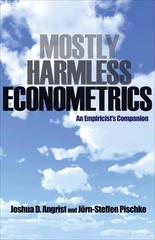Question
An individual derives utility from wealth ( w ) given by the utility function u ( w ) = ( w + 2)4/3 . S/he
An individual derives utility from wealth (w) given by the utility function u(w ) = (w + 2)4/3 . S/he has an initial wealth of Tk.120. S/he is offered a gamble in which s/he would lose a sum of money
h = Tk.20, 25% of the time and win h, 75% of the time.
(a) Without performing any calculations what can you say about the individuals attitude towards risk and why? (2)
(b) Confirm your answer to part (a) by using the Arrow-Pratt measure of absolute risk-aversion. (2)
(c) Calculate E(w), u(w h), u(w + h), u[E(w)], E[u(w)], the certainty equivalent CE and the risk premium P. Does the sign of P agree with parts (a) and (b)? (8 x 1)
Step by Step Solution
There are 3 Steps involved in it
Step: 1

Get Instant Access to Expert-Tailored Solutions
See step-by-step solutions with expert insights and AI powered tools for academic success
Step: 2

Step: 3

Ace Your Homework with AI
Get the answers you need in no time with our AI-driven, step-by-step assistance
Get Started


